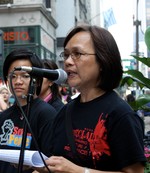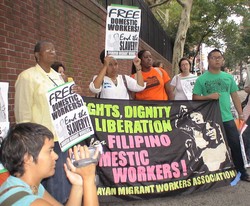By Wayne Gnatuk | Self-Development of People
Lydia finally escaped. From the Philippines, she had come to the United States as a volunteer with her church’s religious mission. At first, she did fundraising work for the church but, after two years, Lydia was sent to New Jersey to serve as a church secretary. Instead, she found herself working as a nanny and domestic worker for one of the church families. She was told that taking care of the family’s three young children was her “special mission.”
The family kept Lydia’s passport and other papers. She slept in the same room with the children, and was required to be available to them 24 hours a day, seven days a week. Given no days off, she was not allowed to attend worship, and wasn’t even free to leave the house. “I was humiliated,” she says, “and threatened.”
After three miserable years of servitude, for which she was paid a total of $200, Lydia finally was able to escape.

Linda Oalican
Several years earlier, Linda, also a Filipino, had come to the United States seeking a better job so that she could send her two children to college. Despite her college education and 14 years of professional work in the Philippines, she was only able to find work as a live-in nanny and housekeeper. Linda learned quickly that working conditions for Filipino domestic workers included extremely long hours of work, wage-and-hour violations, and a lack of respect. Additionally, the lack of labor standards and regulations made the domestic workers even more vulnerable. “But,” Linda notes, “all this barely prepared me for the depth and scale of the abuses and exploitation I found as a live-in nanny and housekeeper.”
“My faith and determination became hope,” says Linda, “when I found other Filipino women domestic workers who wanted to take action to improve our lives. My hope became reality when Self-Development of People, a ministry of the Presbyterian Church (U.S.A.), awarded us $85,000 to support our program for three years.”
Self-Development of People, a ministry of the Presbyterian Church’s One Great Hour of Sharing, makes dreams come true for people contending with poverty, both in the United States and in several other regions of the world. To be funded, a project must be presented, owned, and controlled by an economically poor community group that will benefit directly from their work together.

Damayan Filippino Group
The Filipino domestic workers used the Self-Development of People grant to begin a grassroots non-profit organization, which they named Damayan Migrant Workers Association. (Damayan is a Filipino word that means “helping each other).” Today, domestic workers run Damayan’s core programs addressing the labor, health and gender problems and needs of their members and community. They have a workers’ rights program where they organize monthly legal clinics and where they enable workers to claim their unpaid wages. Damayan’s health program trains their members on the rights of the uninsured and how to navigate the health care system in New York and New Jersey. The organization’s gender rights program teaches members how to identify, prevent and protect victims of sexual harassment and discrimination and domestic violence. “Alongside our core programs,” Linda comments, “we make sure that our members are able to help themselves and other sister domestic workers.”
In 2012, Damayan received additional funding from Self-Development of People which they used to start a new project, Baklas (Break Free) from Labor Trafficking and Modern Day Slavery Project. Through Baklas, trafficked workers are able to heal themselves, and to learn how to identify and use available legal and support services. After Lydia escaped, she became involved with Baklas (Break Free) which, she declares, “started my whole process of healing, transformation and empowerment. In 2011, my T (Trafficking) Visa was approved.”
While life improves for the women involved in Damayan and Baklas (Break Free), there are countless other Filipino workers being trafficked. Because of the global economic crisis, Damayan reports, “There is a stronger push for foreign workers from poor countries like the Philippines to migrate and go to more advanced countries like the United States to look for jobs. In the Philippines, many are leaving every day; 90 percent of them are women and 70 percent of these women become domestic workers, or hotel and restaurant workers, in countries like the United States.”
Through your support of the One Great Hour of Sharing offering, SDOP is changing lives. Please give generously.
![]() You may freely reuse and distribute this article in its entirety for non-commercial purposes in any medium. Please include author attribution, photography credits, and a link to the original article. This work is licensed under a Creative Commons Attribution-NonCommercial-NoDeratives 4.0 International License.
You may freely reuse and distribute this article in its entirety for non-commercial purposes in any medium. Please include author attribution, photography credits, and a link to the original article. This work is licensed under a Creative Commons Attribution-NonCommercial-NoDeratives 4.0 International License.